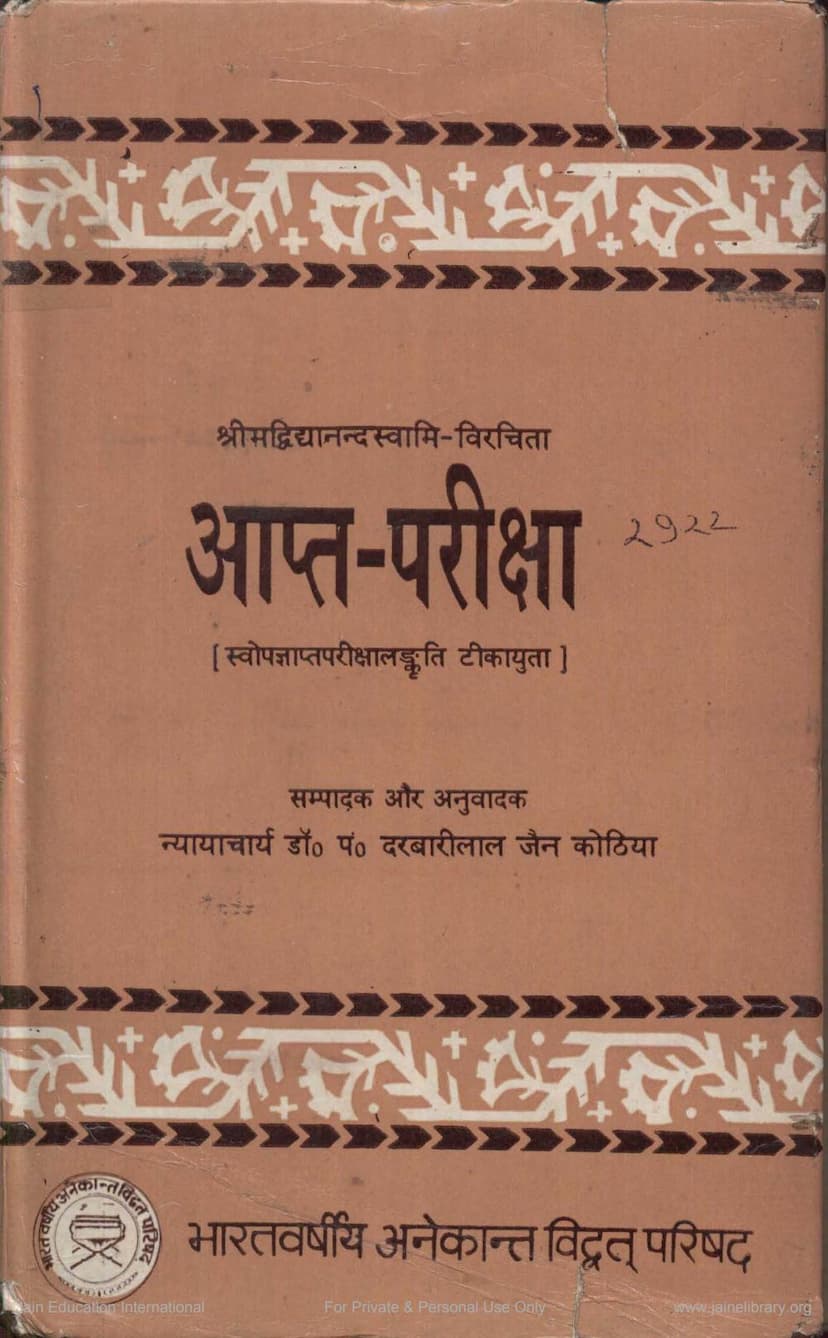Aptapariksha
Added to library: September 1, 2025

Summary
Here's a comprehensive summary of the Jain text "Aptapariksha" by Acharya Vidyānand and edited/translated by Darbarilal Kothiya, based on the provided pages:
Title: Aptapariksha (आप्त-परीक्षा) Author: Acharya Vidyānand (श्री विद्यानन्दी स्वामी) Commentary: Svopadnyāptaparikṣālaṅkr̥ti (स्वोपज्ञाप्तपरीक्षालङ्कति) by Acharya Vidyānand himself. Editor & Translator: Nyāyāchārya Dr. Pandit Darbarilal Jain Kothiya Publisher: Bharatavarshiya Anekānt Vidwat Parishad Edition: Second Edition, published in Vikrama Samvat 2518 (1992 CE).
Overview:
The "Aptapariksha" is a seminal work in Jain logic and philosophy, authored by the renowned scholar Acharya Vidyānand. The text's primary objective is to critically examine and establish the truthfulness and authority of an "Āpta" (आप्त), which in Jainism refers to a perfectly enlightened being, such as a Tirthankara or Arihant, who is free from all defects and possesses omniscience. The book aims to refute the claims of other philosophical systems regarding their respective founders or deities as Āptas and to demonstrate the supremacy of the Jain Āpta, particularly the Tirthankaras, as the ultimate source of true knowledge.
Key Themes and Arguments:
-
The Concept of Āpta: The text delves into the definition and characteristics of an Āpta, emphasizing that a true Āpta must be free from delusion, possess perfect knowledge of all realities (omniscience), and be a guide to the path of liberation (moksha).
-
Refutation of Other Systems: A significant portion of the book is dedicated to analyzing and refuting the doctrines of other philosophical schools, particularly those that claim their founders or deities (like Ishvara, Kapila, Buddha, Brahman) are Āptas. Acharya Vidyānand systematically analyzes their epistemological claims, their understanding of reality, their assertions of omniscience, and their claims of being guides to liberation, exposing their logical inconsistencies and contradictions with the help of Jain logic and philosophy.
-
The Nature of Ishvara (God): A substantial part of the "Aptapariksha" is devoted to the "Ishvara Pariksha" (ईश्वर-परीक्षा), where the concept of a creator God, as prevalent in Vedic and other Indian philosophical traditions, is thoroughly scrutinized. Acharya Vidyānand argues against the existence of an Ishvara as the creator of the universe, questioning the coherence of attributes like omniscience, omnipotence, and the ability to create from nothing, especially for a being that is claimed to be eternal and unchangeable. The arguments address:
- The Problem of Creation: Questioning how an eternal, unchanging being could create a changing world.
- The Problem of Purpose: Why would a perfect being create a world with suffering?
- The Problem of Knowledge: If Ishvara is omniscient, it should know all possibilities and impossibilities.
- The Problem of Causality: The impossibility of an eternal, unchanging entity being the cause of a transient world.
- The Problem of Unchanging Nature: How an unchanging entity can effect change.
-
The Jain Āpta (Arihant): The text establishes the Arihant as the true Āpta. It highlights their liberation from all karmas, their attainment of omniscience, their perfect equanimity (vitaraagata), and their role as the true guides to liberation. The uniqueness of the Jain Āpta's knowledge and teachings is emphasized.
-
The Role of Knowledge and Experience: Acharya Vidyānand meticulously discusses the nature of valid knowledge (pramāṇa) and its relation to perception (pratyakṣa), inference (anumāna), and scripture (āgama). He argues that true knowledge must be free from all defects and contradictions and that only the Jain Āpta's teachings fulfill these criteria.
-
Logic and Syādvāda: The text employs rigorous Jain logic and the principle of Syādvāda (conditionally true statements) to analyze and refute opposing viewpoints. The arguments are presented with great precision and clarity, making the text a valuable resource for understanding Jain dialectics.
-
Structure of the Text: The book follows a logical progression, starting with the praise of the Parameṣṭhis (the five supreme beings in Jainism), establishing the necessity of an Āpta, then systematically examining and refuting the concepts of Ishvara, Kapila, Buddha, and Brahman as Āptas, and finally establishing the Arihant as the sole true Āpta. The text includes detailed analyses of concepts like karma, bondage, liberation, omniscience, and the nature of reality according to various philosophical schools.
Commentary and Translation:
The "Aptapariksha" includes the original Sanskrit text with Acharya Vidyānand's own commentary, "Aptaparikṣālaṅkr̥ti." The provided edition is further enriched by a Hindi translation and extensive introduction and commentary by Nyāyāchārya Dr. Pandit Darbarilal Jain Kothiya. Dr. Kothiya's scholarly work aims to make this complex philosophical text accessible to a wider audience, explaining its intricate arguments and historical context.
Significance:
"Aptapariksha" is considered a cornerstone of Jain epistemology and metaphysics. It is highly regarded for its intellectual rigor, its comprehensive critique of rival philosophical systems, and its definitive establishment of the authority and unique position of the Jain Āpta. The text serves as a fundamental text for advanced study in Jain philosophy and logic, demonstrating the depth and sophistication of Jain intellectual traditions.
In essence, "Aptapariksha" is a profound logical inquiry that meticulously dissects the concept of an infallible guide, demonstrating through rigorous reasoning and critique that the Jain Tirthankaras, the Arihants, alone fit this description, offering the true path to liberation.